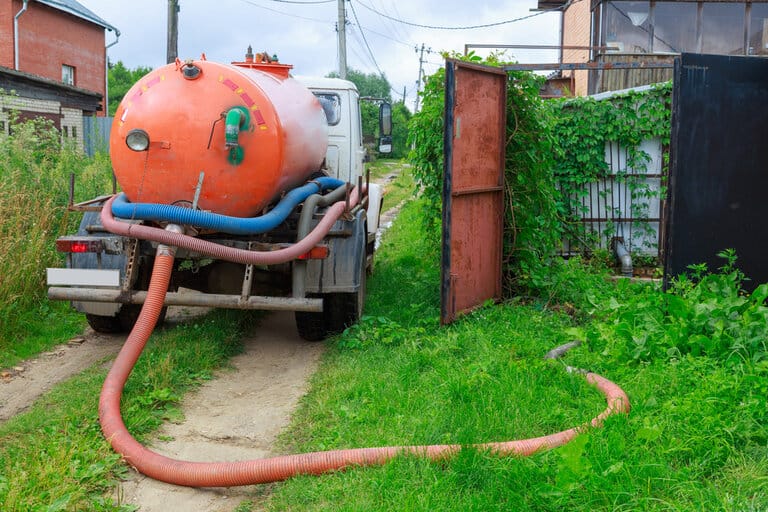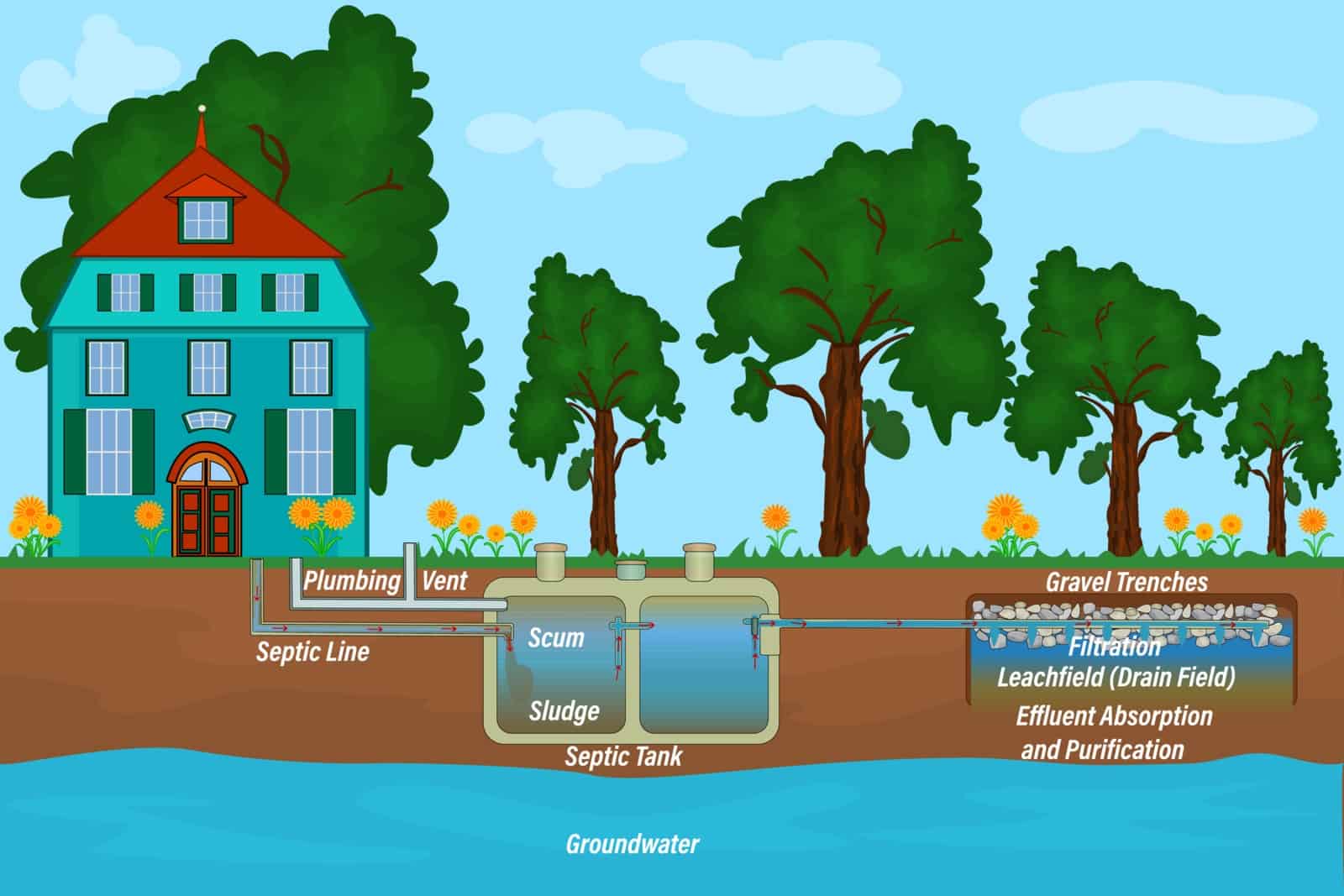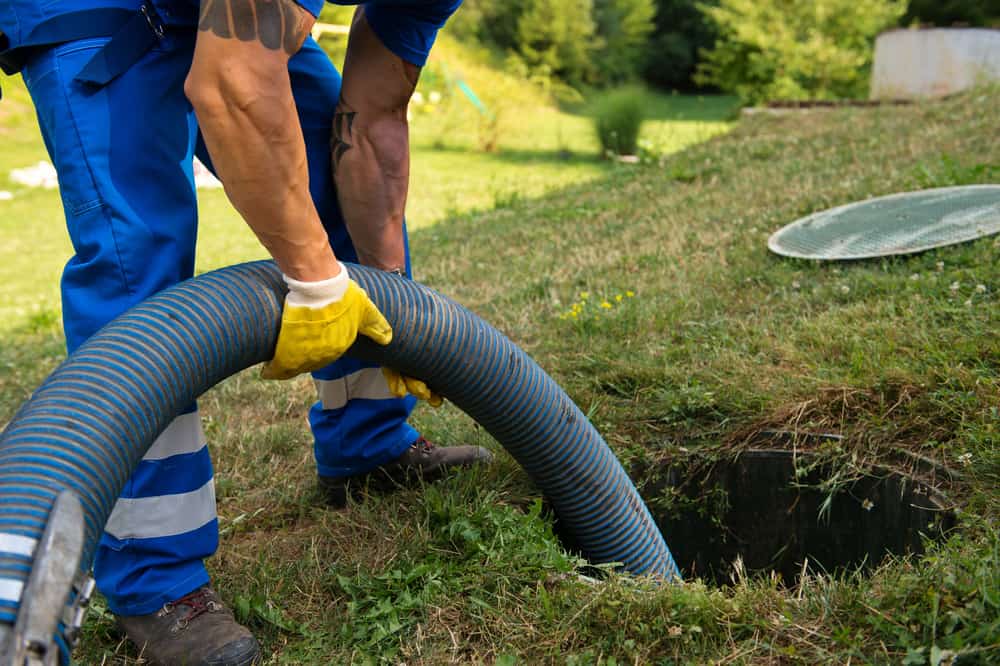The idea that you as a homeowner are now responsible for the management of your own sewage can be a little unsettling. You probably have a hundred questions about living with a septic system, and we have the know-how that you need to make this endeavor a success.
The key to uncertainty is education, so read on to have all of your septic tank and septic tank cleaning questions answered.
You have picked out the homestead, and you are infatuated with the country life. You just can’t wait to move in, start your garden, and buy your chickens. But then the realtor says two words that send a chill through your bones: septic system.
It’s not that this is a deal breaker, but it might make you a bit nervous. After all, in the past, you simply paid a monthly fee and flushed the toilet without ever considering the next steps in the waste management process. What about septic tank cleaning? What about problems with the system?
Septic Tank Basics
You may believe that a septic tank is simply a large underground container that holds all of your family’s waste products. That is only partially correct. The septic tank itself is a large container buried in the ground. Connected to the septic tank are the field lines. Also called leach lines or the leach field, the field lines consist of several long, perforated drain pipes buried shallowly in the ground.
Your household drains are connected to the septic tank. Inside the tank, the waste separates into three distinct layers. The solids sink down to the bottom of the septic tank.
Fats, oils, and greases, called the scum layer, float to the top of the septic tank. The center layer of the material in the septic tank consists of liquids called effluent. A pipe allows the effluent in the septic tank drain out into the field lines. The effluent seeps out of the perforated pipes and into the ground. The layers of dirt, gravel, and sand purify the liquid until it is free from contaminants by the time it reaches the groundwater.
The real magic of the septic system takes place by way of microscopic bacteria in the septic tank itself. The bacteria digest much of the solids and other materials in the tank, preventing the tank from filling frequently with solids.
The bacteria are a self-sustaining colony, as long as you properly maintain your septic system. Eventually, however, you will need to arrange for septic tank cleaning or pumping.
There are a few variations on this general set up. Some systems might include an electric pump and others may include a sand filter. When you call your septic tank cleaning company to come out to your property, they can check out your system and give you the basics on how it works.

When to Call a Septic Tank Tech
You don’t have to constantly worry about cleaning your septic system, but if you notice any of the following, you should make a call to the septic maintenance company.
1. Sewage inside the home
First, if you notice sewage in your house, this is an emergency situation. Stop flushing toilets, don’t take a shower, and turn off the dishwasher. You don’t want to put anything else in your septic system until it is pumped out.
You should sanitize your showers and tubs. Sanitize anything else that has had contact with sewage after the septic pumping company leaves.
2. Sewage smell
Second, if you smell sewage in your home or in your yard, that is a sign that your septic system might need some attention. You may want to reduce what you put down the drain until you have checked with the septic company.
3. Pooling water in yard
Third, if you have water pooling in your yard near the septic tank or the field lines, you should have your septic tank checked. There may be a clog that is keeping the field lines from draining.
Also, if your field lines have soft, spongy soil topped with bright, rich green grass, you may be seeing indications that your field lines might need some attention.
What’s the Difference Between Septic Tank Pumping and Septic Tank Cleaning?
Many people use the terms septic tank pumping and septic tank cleaning interchangeably. It’s best to double-check with your provider to make sure that you explain your situation or what you want when you schedule your service call.
Some septic tank people will only pump out the liquids and floating scum layer in the tank, leaving the sludge layer untouched. For some situations, that will suffice. If the sludgy layer at the bottom isn’t very high, then just removing the top two layers with septic tank pumping will be adequate.
Septic System Cleaning
However, if the sludgy layer at the bottom is too thick and the sludge is compacted and solid, you may need to have the septic tank cleaned. Septic system cleaning takes a bit more time and effort, so it will cost more money.
In cleaning the septic tank, the company will pump out the liquid and the floating scum layer. Then, they will go a step further by removing the sludge layer.
Sometimes this sludge is very thick and compact. It will need to be broken up by high-powered jet nozzles before it can be pumped out. Sometimes, a layer of roots will be in the bottom of the tank, and sludge will be imbedded in the roots. This may take other specialized equipment.
Be sure that you are clear with the septic pumping company about what they are recommending. It’s important you understand what you are paying for. Know how much it costs before you agree for them to do the work.
They may or may not use the terms “septic tank cleaning” and “septic tank pumping” interchangeably. Don’t be afraid to ask questions so that you can communicate clearly.
Depending on your usage, you may only need your septic tank pumped once every 2 or 3 years. Your tank may need to be cleaned every 3 to 5 years. Your technician can explain the recommended intervals based upon your family’s usage and your septic system’s design.
How Often to Schedule Septic Tank Cleaning and Pumping
The EPA recommends that people who have septic systems have their tanks pumped every 3 to 5 years. This is a very good guideline, but there are some variables that may increase or decrease the pumping interval.
If you have a small family and a larger septic tank, you may be able to put off your septic system pumping for a few more years. The reverse is also true. If your septic tank is small or if you have an unusually large family, septic tank pumping might need to happen more frequently.
Of course, if you spot any of the signs of trouble listed above, you should call the septic maintenance company as soon as you can.
When you move into a home, you may want to have the septic tank pumped or even cleaned when you get there. This will give you a good baseline for when to start counting your three to five years.
When the technician is at your home, ask for the tech to check the septic tank and make sure that everything is working correctly.
Even if it isn’t a “pumping” year, you might want to schedule an annual visit with your septic company just to have the system examined for any potential problems.
Most of the time, the solids in the tank should be about a third of the total volume of the tank. If they start getting higher than that, you may need to increase your pumping frequency. This will help prevent having a sewage backup at the most inopportune moment.

Costs for Septic System Cleaning and Pumping
Septic tank cleaning costs and pumping costs can vary widely. Of course, if you live in an area with a high cost of living, it will cost more there than in a place with a lower cost of living.
How Much Does Septic Tank Pumping Cost?
Generally, a good average cost is about 30 cents per gallon of sewage to have your septic tank pumped.
If you have a larger septic tank, say, 1000 gallons, it will cost about 300 dollars to have it pumped. However, if you have a smaller one, like 600 gallons, it will cost about 180 dollars to have it pumped.
While this sounds like something that would need to occur frequently, it isn’t necessarily an annual chore. If the septic tank is the proper size for your family and if it is working properly, you can go for several years between servicing. The bacteria in the tank do a very good job of breaking down the sludgy solids in the bottom of the tank and greatly reducing the volume of this matter.
How Much Does Septic Tank Cleaning Cost?
Septic tank cleaning costs can be a bit more expensive. After all, it will take longer, and you will pay for a greater volume of sewage to be removed from the tank. A national average for septic tank cleaning cost is about $700.
However, if you have a more complicated system or a large volume of compacted sludge, it may cost more.
Owning a Septic System
If you wish to reduce the number of times that you have to pump or clean your septic tank, there are a few things that you can do.
1. Be aware of water usage
First, avoid excessive water usage. Taking shorter showers, installing more water efficient toilets and dishwashers, and repairing leaky faucets can reduce the amount of liquid that ends up in your septic system.
Also be mindful of when you run the water-using appliances. For example, if three people in your household will take a shower at night, don’t also run the dishwasher or the washing machine in the evening. Spread out how much water will be expended over the course of a day so it’s not all at once.
2. Watch what you flush
Only flush human waste and toilet paper down the toilet. Paper towels, tampons, and cleaning wipes will not break down in your tank. Even flushable wipes should be avoided.
Throw these things in the garbage can and dispose of them with the rest of your household trash.
3. Don’t toss it in the kitchen sink
If you have a garbage disposal in the sink, use it sparingly. Collect grease in a container and throw it away in the trash. Never let it go down the sink.
4. Avoid harsh cleaning products
Avoid using harsh chemicals in your home. Things like bleach can disrupt the bacterial action that is so essential to a properly operating septic system. If you do use bleach in an occasional load of laundry or for cleaning, use as little as possible. Don’t use it frequently.
5. Reroute water
It’s important to orient gutters and downspouts to direct water away from the septic tank and field lines. If the ground around the septic tank and field lines becomes saturated, it will not operate as it should. Additionally, too much rain water can infiltrate your septic system and interfere with the way that it works.

Cleaning a Septic Tank
Unlike things like new paint, pretty cabinets, or gorgeous flooring samples, septic systems are not one of the sexiest parts of your home. However, they are incredibly important. While your septic tank will need a bit of attention from time to time, like other parts of household maintenance, tending to your septic system will soon be second nature. There is no need to worry about owning a home that has a septic system.
Septic tanks are common in rural areas as well as in some unincorporated areas of larger cities. It’s not only for living off the grid.
Understanding the basics of how a septic system works and when to arrange septic system cleaning or pumping is important. However, the techs will handle the dirty work.

